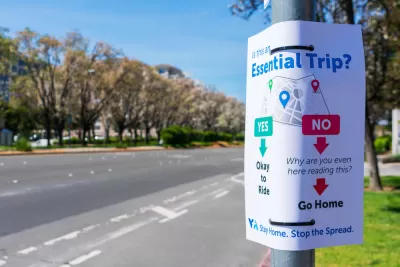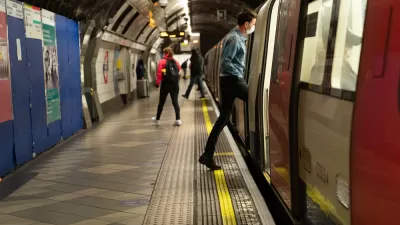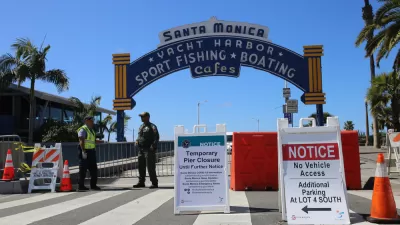Ridership is the wrong way to think about the importance of public transit.

Workers keeping the nation's essential industries and services going are still using transit, but there isn't much good news or positive thinking regarding public transit during the COVID-19 pandemic.
Transit ridership is in free-fall, plunging transit agencies all over the country into an unprecedented fiscal crisis. The CARES Act federal stimulus offered some relief for the fiscal situation facing transit agencies, but the long-term prognosis is completely uncertain. In New York City, the coronavirus has had tragic consequences for transit operators.
This tweet by Richard Florida sums up what most people are probably assuming about the prospects of maintaining public support for transit during and after the pandemic.
People will be scared of subways, busses & trains for some time, with implications beyond transit systems.
They will turn to cars, congestion will increase.
Wonderful transit-connected suburbs may suffer.
Demand for close-in walkable, bikeable neighborhoods will grow. https://t.co/sPJrly2qP7— Richard Florida (@Richard_Florida) April 9, 2020
So, what can be said in defense of the operation and use of public transit in a public health crisis like the COVID-19 pandemic? According to Jarret Walker, a transit planning consultant involved in some of the most innovative bus redesign projects in the United States during the past decade, transit is not just essential in these uncertain times, it's more important than ever.
"The goal of transit, right now, is neither competing for riders nor providing a social service for those in need. It is helping prevent the collapse of civilization," writes Walker for CityLab.
The catch, according to Walker, is that public transit has always been playing that critical role.
Those “essential service” workers, who are overwhelmingly low-income, have always been there, moving around quietly in our transit systems, keeping our cities functioning. Too often, we have patronized them by calling them needy or dependent when in fact everything would collapse if they couldn’t get to work.
Walker's purpose in writing this article is not to look at the crisis with rose-colored glasses, or diminish assessments of the long road back to recovery for transit agencies. Walker doesn't even suggest that sentiments like those expressed above by Richard Florida are wrong. Walker does suggest its time for everyone, first and foremost journalists, to reframe the discussion away from questions about ridership, and toward a better understanding of the essential service provided by transit agencies.
FULL STORY: In a Pandemic, We're All 'Transit Dependent'

Study: Maui’s Plan to Convert Vacation Rentals to Long-Term Housing Could Cause Nearly $1 Billion Economic Loss
The plan would reduce visitor accommodation by 25,% resulting in 1,900 jobs lost.

North Texas Transit Leaders Tout Benefits of TOD for Growing Region
At a summit focused on transit-oriented development, policymakers discussed how North Texas’ expanded light rail system can serve as a tool for economic growth.

Using Old Oil and Gas Wells for Green Energy Storage
Penn State researchers have found that repurposing abandoned oil and gas wells for geothermal-assisted compressed-air energy storage can boost efficiency, reduce environmental risks, and support clean energy and job transitions.

Santa Barbara Could Build Housing on County Land
County supervisors moved forward a proposal to build workforce housing on two county-owned parcels.

San Mateo Formally Opposes Freeway Project
The city council will send a letter to Caltrans urging the agency to reconsider a plan to expand the 101 through the city of San Mateo.

A Bronx Community Fights to Have its Voice Heard
After organizing and giving input for decades, the community around the Kingsbridge Armory might actually see it redeveloped — and they want to continue to have a say in how it goes.
Urban Design for Planners 1: Software Tools
This six-course series explores essential urban design concepts using open source software and equips planners with the tools they need to participate fully in the urban design process.
Planning for Universal Design
Learn the tools for implementing Universal Design in planning regulations.
Ascent Environmental
Borough of Carlisle
Institute for Housing and Urban Development Studies (IHS)
City of Grandview
Harvard GSD Executive Education
Toledo-Lucas County Plan Commissions
Salt Lake City
NYU Wagner Graduate School of Public Service




























